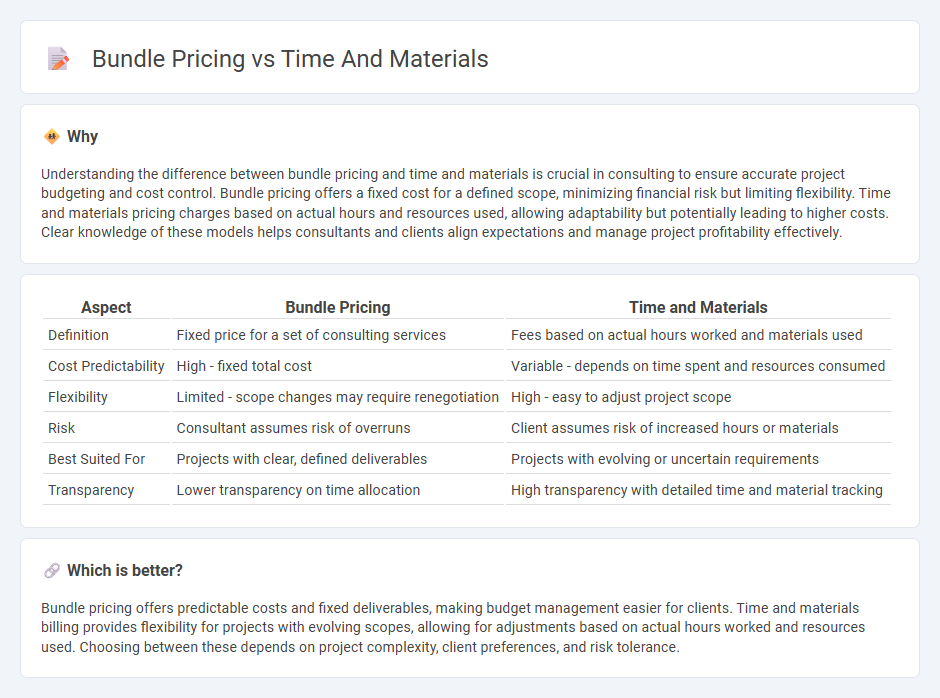
Bundle pricing offers a fixed cost for a comprehensive set of consulting services, providing predictable budgeting and streamlined project management. Time and materials billing charges clients based on actual hours worked and resources used, allowing for flexibility and scalability throughout the project lifecycle. Explore detailed comparisons to determine the best consulting pricing model tailored to your business needs.
Why it is important
Understanding the difference between bundle pricing and time and materials is crucial in consulting to ensure accurate project budgeting and cost control. Bundle pricing offers a fixed cost for a defined scope, minimizing financial risk but limiting flexibility. Time and materials pricing charges based on actual hours and resources used, allowing adaptability but potentially leading to higher costs. Clear knowledge of these models helps consultants and clients align expectations and manage project profitability effectively.
Comparison Table
| Aspect | Bundle Pricing | Time and Materials |
|---|---|---|
| Definition | Fixed price for a set of consulting services | Fees based on actual hours worked and materials used |
| Cost Predictability | High - fixed total cost | Variable - depends on time spent and resources consumed |
| Flexibility | Limited - scope changes may require renegotiation | High - easy to adjust project scope |
| Risk | Consultant assumes risk of overruns | Client assumes risk of increased hours or materials |
| Best Suited For | Projects with clear, defined deliverables | Projects with evolving or uncertain requirements |
| Transparency | Lower transparency on time allocation | High transparency with detailed time and material tracking |
Which is better?
Bundle pricing offers predictable costs and fixed deliverables, making budget management easier for clients. Time and materials billing provides flexibility for projects with evolving scopes, allowing for adjustments based on actual hours worked and resources used. Choosing between these depends on project complexity, client preferences, and risk tolerance.
Connection
Bundle pricing and time and materials are connected through their common use in consulting contracts to balance cost predictability and project flexibility. Bundle pricing offers a fixed fee for a predefined set of services, while time and materials billing charges based on actual hours worked and resource usage, allowing adjustments as project scope evolves. Combining these models enables consulting firms to provide clients with cost certainty for core deliverables alongside adaptable billing for variable or extended tasks.
Key Terms
Billing Structure
Time and materials billing structure charges clients based on actual hours worked and materials used, promoting transparency and flexibility in project costs. Bundle pricing consolidates services or products into a single fixed fee, simplifying budgeting but potentially limiting scope adjustments. Explore detailed comparisons to determine which billing structure aligns best with your project needs.
Scope Flexibility
Time and materials pricing offers high scope flexibility by billing clients based on actual hours worked and materials used, allowing easy adjustment to evolving project requirements. Bundle pricing, with a fixed scope and price, limits flexibility but provides predictable cost management and clear deliverables. Explore more about how scope flexibility impacts project success and pricing decisions.
Cost Predictability
Time and materials pricing involves billing clients based on actual work hours and materials used, offering flexibility but less cost predictability due to potential scope changes. Bundle pricing provides a fixed cost for a predefined set of services or deliverables, enhancing cost predictability and simplifying budgeting for clients. Explore how choosing the right pricing model can optimize project management and financial planning.
Source and External Links
Time and Materials Contract (T&M): When to Use One & Best Practices - A time and materials contract is a legally binding agreement where payment is based on actual labor hours at an hourly rate plus costs of materials with markups, often used when project scope is uncertain.
Time and Materials (T&M) Contracts: How They Work and ... - NetSuite - T&M contracts specify a job's purpose with hourly labor rates and materials costs; they are best when scope or duration cannot be fully determined upfront and typically include labor rates, material markups, and sometimes a maximum price.
What Is a Time and Materials Contract? - Ironclad - A time and materials contract requires clients to pay for contractor time and materials with an hourly rate plus material markup, often with an initial estimate but no firm final price guarantee.
 dowidth.com
dowidth.com